25 Social Media Tools That Experts Use to Streamline Their Marketing

With more than 3.6 billion social media users worldwide, social media marketing cannot be ignored.
Savvy marketers know social media is a vital part of every marketing campaign. For businesses, every social media platform is an opportunity to engage with their target audience.
Even marketing stars know that strategizing and managing even a few social networks can be overwhelming without the right management social media tools in place.
Consider this:
- 60 percent of company mentions on Twitter occur when you aren’t in the office.
- 64 percent of consumers expect real-time responses from brands they mention on social media.
- 40 percent of users expect brands to respond within the first hour of reaching out, and 79 percent expect a response within 24 hours.
- 54 percent of people on social media use it to research products.
How can you keep up with your Twitter account when you haven’t even checked Facebook, Instagram, and TikTok today? What about all those new social media sites that are popping up every other day (or so it seems)?
How do you know which ones to target for your brand and which to skip?
Take a deep breath.
Managing your social media shouldn’t be overwhelming. Social media tools can help:
- Save you time by doing the posting, social listening, and hashtag research for you.
- Save you money by allowing you to allocate resources to other tasks.
- Maybe even save your brand’s reputation by catching a negative post in time for you to run interference and resolve the issue quickly.
I’ve done the research for you and organized the top social media marketing into five categories. We start with tools that help with the four stages of social media marketing: discovery, creation, monitoring and scheduling, and analyzing. Then, I added a fifth miscellaneous category at the end.
If you find yourself stuck in a particular stage, just head down to the relevant section.
Are you ready to get productive, optimize your social media marketing, and become an expert social media marketer?
Let’s begin.
Content Research and Discovery
According to Statista, users post 347,222 stories to Instagram, and 157,000 share messages on Facebook every minute. It can be overwhelming to find value-added content in all that noise.
Let’s look at content curation social media tools that help filter meaningful content so you can find images, posts, and conversations that will resonate with your audience.
1. Nuzzel
This tool organizes stories shared by friends and followers on Twitter, Facebook, and other social apps. It’s available as a web, Android, and iOS app.
It displays aggregated stories from your social media circle as easy-to-read links in a feed. You can also add influencers in your niche.
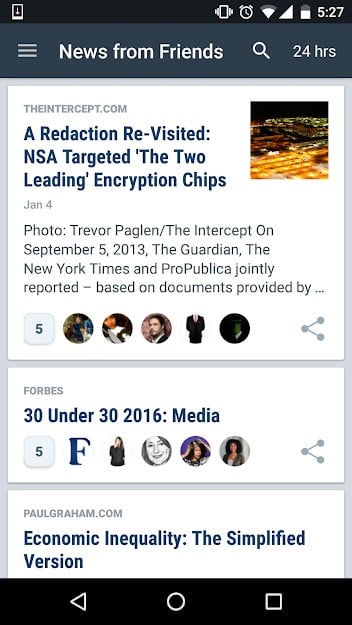
You can catch up on news from the last hour, or go through the past week using the “Sort By” option. You can tap into content shared by your second-degree connections, as well.
Finally, you can also curate content from your newsfeed into an email newsletter.
2. Feedly
Feedly aggregates the top content in your niche from industry blogs and other publications. Their AI bot, Leo, acts as a research assistant that learns your reading habits and delivers articles you’ll be interested in.
It then “reads” each article and annotates them with relevant summaries, analyses, and links to relevant content.
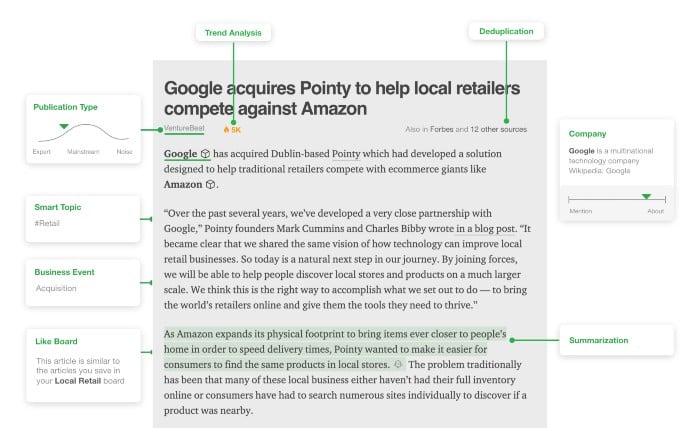
Leo learns from your behavior. If you save an article, it will show you more like it. If you click “less like this,” Leo will remember and show you fewer articles on that topic.
You can also set up priorities within topics. Choose a sub-topic, and Leo will include those articles under a Priorities tab.
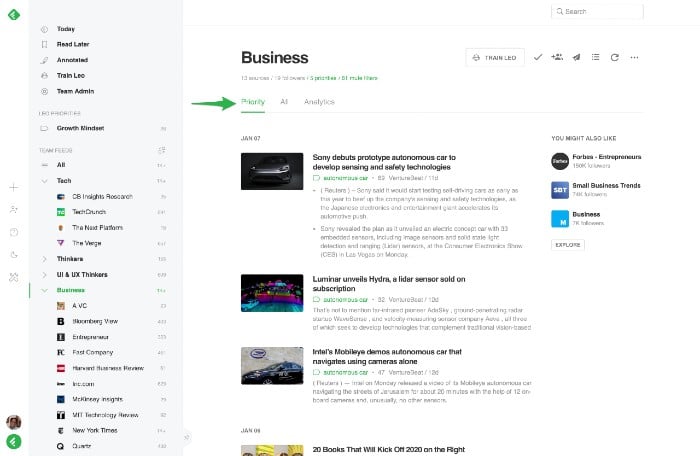
3. BuzzSumo
There are several reasons I love this tool. On top of content discovery, you can use it to research keywords, track online trends, and even find influencers within your vertical.
Use it to dissect your competition, understand your audience, and find content with the most social network shares.
The Chrome extension lets you do your research while you browse, as well. To use it, enter your keyword or phrase to discover the top-performing content.
You can use the filters to customize your search by language, time frame, country, and a number of other parameters.
You can find the popularity of content on a particular social network by using the “sort by” feature.
You can also plug a blog URL into the tool to find its top-performing content pieces.
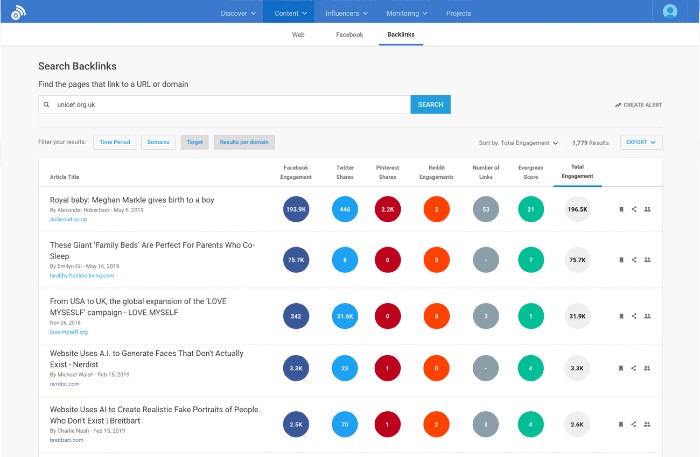
4. Tagboard
This is another great social media tool for monitoring and searching for hashtags relevant to your industry and track brand mentions.
To start your search, plug in the keyword, and the tool delivers content from several platforms.
Here are search results for #neilpatel:
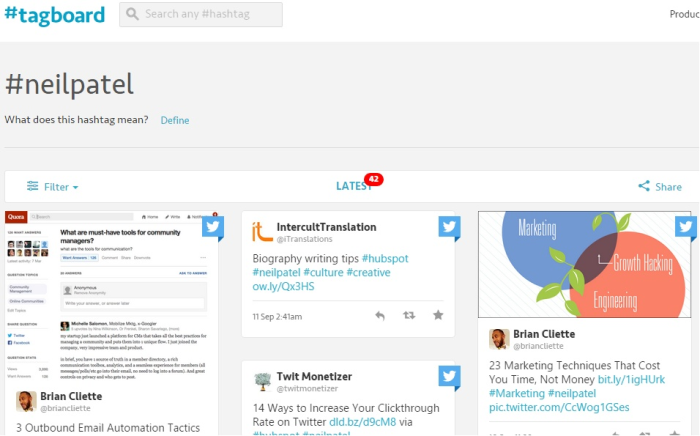
You can directly respond to these mentions, right from the screenshot page.
On the right sidebar, you get useful stats around the frequency and sentiment of your hashtag.
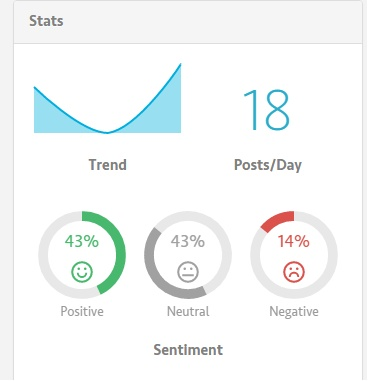
Tagboard is especially useful to track conversations and engagement during conferences and live events.
Visual Content Creation
According to Venngage, 49 percent of surveyed marketers rated visual content as very important, but 43 percent said producing it consistently was their biggest challenge.
Social media has become undeniably visual, and having a presence on Instagram, Pinterest, TikTok, YouTube, and other visual platforms is paramount.
Here are a couple of social media tools to help you create videos, images, diagrams, Pinterest boards, infographics, and more.
5. Canva
This is a simple graphic design web tool with pre-made templates for all kinds of social networks and uses.
It combines some of the best elements of Photoshop with a drag-and-drop functionality.
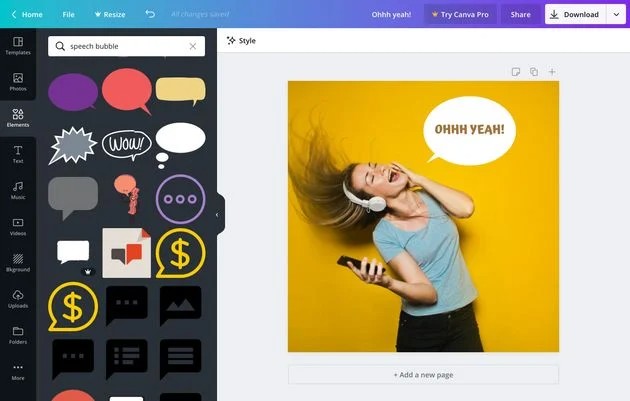
For every template, there are a variety of layouts, fonts, and backgrounds to choose from. And if you find yourself having trouble with a particular functionality, there are free tutorials to help you design better graphics.
For example, if you’re considering repurposing your most shared content for an infographic, there’s a tutorial for creating simple infographics with Canva.
Here are ten websites to source free and premium stock photos you can use in your designs.
6. Biteable
Biteable allows you to create videos, animations, motion graphics, and a number of other visuals for social, ads, and even presentations. You can use any of their templates to get started.
You can sync your marketing calendar with theirs to get tips and ready-to-go video templates for relevant seasons, holidays, and events.
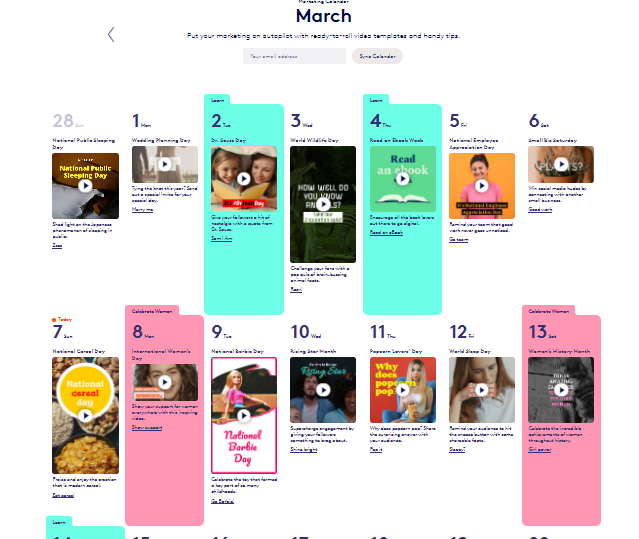
7. Pixlr
Pixlr is a freemium service with a lot of the functionality of Photoshop.
Its free services include Pixlr X (for express) with essential tools for quick editing. Pixlr E (for editor) offers a more extensive selection of tools for more sophisticated content creation and Remove BG, an AI-based background removal tool.
If you need even more photo editing capabilities, they offer a subscription-based plan that includes more stickers, overlays, and visual effects, as well.
Pixlr offers templates, as well, some free and some part of the subscription service.
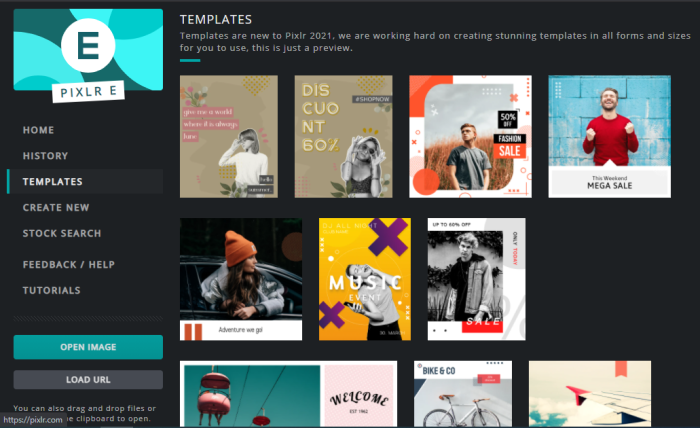
Pro Tip: One-Pixel Pinterest Image
The images you share on Pinterest should be vertically aligned. But, if you insert a tall image directly into a blog post, it’ll take up a lot of real estate.
The solution is uploading the tall Pinterest image below the first picture of your post. Then, change its height and width to one pixel each.
Now, the image will appear when you click on the “Pin it” button to share on Pinterest. The alt text of the Pinterest image automatically serves as the caption for the image.
Monitoring and Scheduling
It’s impossible to manage your brand’s social media accounts 24 hours a day, seven days a week. But the world of social media doesn’t turn off at 5 p.m.
Social media tools for monitoring and scheduling can help. They can save you hours every week by combining your brand activity from multiple social media networks into one dashboard.
8. Hootsuite
Hoot is a full-service social media management tool that lets you track mentions, engagement, and other metrics across all of your social platforms. You can schedule and track posts using their analytics tools and respond to mentions via your dashboard.
9. Buffer
This is an amazing app to schedule updates from your social network accounts at the times that you work best for your brand.
It works a lot like Hootsuite. You can create and schedule social posts, and then track them through their analytics.
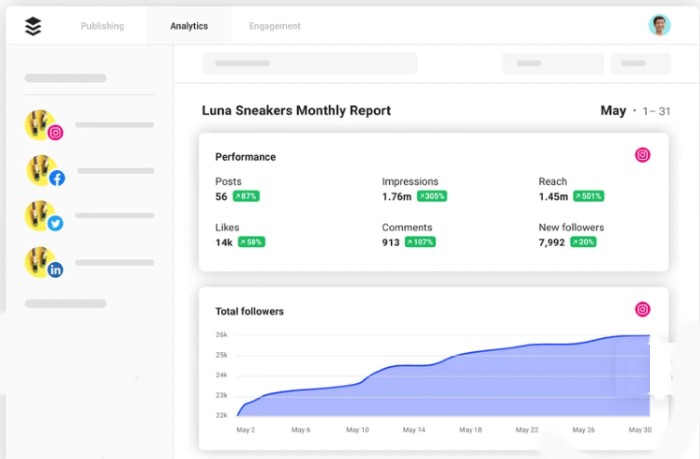
Buffer will also prioritize social mentions for you, so you can respond to the most pressing ones first.
10. Hopper HQ
Hopper HQ connects your brand with top content creators in your vertical. Once you choose from a list of recommended creators, they deliver content you can share in posts and paid ads.
11. CoSchedule
CoSchedule is a simple, integrated social media and blog publishing calendar.
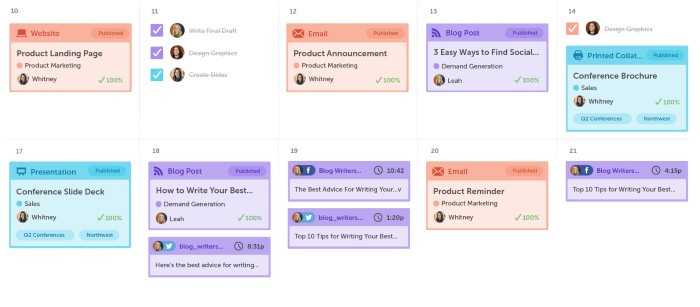
It also includes a suite of organizing tools for social media, brand assets, work, and content. Schedule your blog posts, collaborate with different authors on a post, and assign specific tasks to different people.
It has an easy-to-use, drag-and-drop interface, as well.
In the calendar view itself, you can also keep track of the most shared and engaged with content.
12. IFTTT
If This Then That is a fantastic social media tool to connect applications and automate social actions. IFTTT offers a series of applets that allow you to connect platforms and streamline your work.
For example, you can send your Instagrams to Twitter as native tweets. You can also get a weekly notification email of all of the people who followed you on Twitter. You can also archive tweets to a Google spreadsheet.
You can create your own applet from scratch by choosing a trigger and appending an action to it.
Or, you can use applets created by other people.
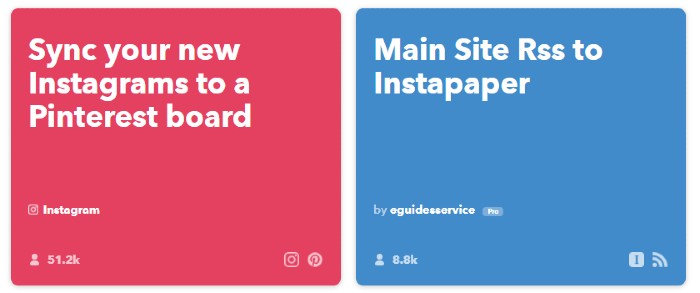
In this article, Kristi Hines explains a killer recipe to directly schedule social media updates from your Feedly account.
You can schedule the articles you choose to read later in Feedly on your social network accounts through Buffer. You only need Gmail and Buffer accounts to set up this applet.
Social Media Analytics
The best way to find the most effective social network for your business is by tracking your social media marketing efforts.
The right data allows you to calculate ROI from your social media marketing campaigns. It’ll help you find your top-performing content, so you can tweak your campaign and optimize your marketing efforts.
Let’s look at a few social media tools to measure and analyze your social activities.
13. Google Analytics
Google Analytics is one of the most widely used analytics tools to track user behavior on websites. But, you can also track social reports under its reporting tab.
To access your social network standing, log into your Analytics account. Then, head over to the Reporting tab. Click on Acquisition > Social.
Set up goals inside Analytics to access these social reports. There are standard templates inside analytics you can use to set actionable goals for your social media marketing campaigns.
If you get stuck, use Google’s official step-by-step guide for setting goals.
There are eight reports you can see under social analytics–Overview, Network Referral, Data Hub Activity, Landing Pages, Trackbacks, Conversions, Plugins, and Visitors Flow.
Once you set up goals, you’ll be able to see your social media impact in Overview.
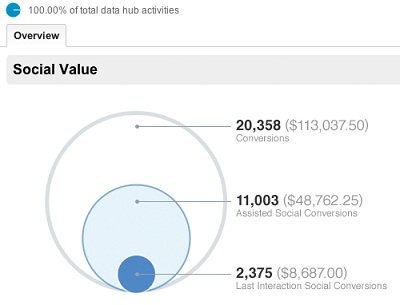
The most important report is conversions.
You can break down your social media campaign by network and find out the most successful platform.
If you’re interested in the user behavior–the like and share buttons your visitors are clicking–you’ll need to set up social plugins.
Although setting up this report might take time, the end results are worth the effort:
A clear picture of the social network that provides the best ROI and the kind of content you should create for it.
14. HubSpot
HubSpot has a number of tools, from marketing automation to a full content management system. Their Marketing Hub allows you to create and manage social media posts, video for social, and conversations from their platform.
15. Followerwonk
To get the best results from a real-time social network like Twitter, you need to be active when your followers are online.
Followerwonk analyzes your Twitter followers and tells you when your followers are most active.
You can also use it to find influencers in your niche and discover relevant people to follow.
You can also track your followers by demographics, such as age.
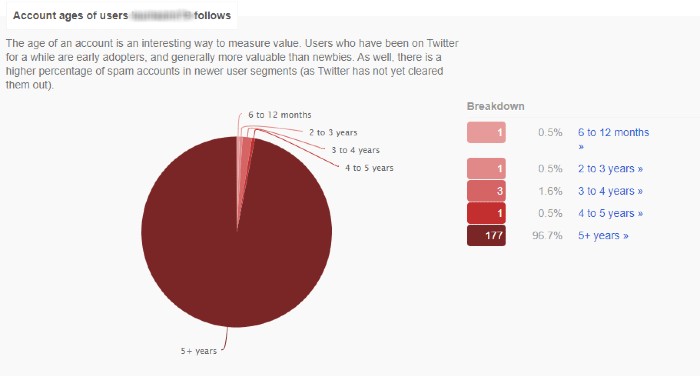
16. Olapic
Olapic is a great tool to add to your visual marketing arsenal. You can use the tool to discover, curate, and schedule user-generated content across Instagram, Pinterest, and all your other social accounts.
Use it on your site, in your social ads, and in your emails to lift engagement and increase conversions.
17. Keyhole
For Instagram and Twitter, a good hashtag analyzer can go a long way. Keep up-to-speed on hashtags relevant to your industry with Keyhole.
The tool also uses machine learning to forecast whether your campaigns will hit their goals.
Finally, Keyhole tracks and monitors influencer performance. You can use it to compare influencers to determine who is most effective for your brand.
18. Semrush
Not only does Semrush allow you to create, schedule, and track your own posts, it also lets you track and analyze your competitors’ posts, too. You can also use it to optimize your social ads.
SEMRush is also helpful for general keyword and content research in your vertical (or you can also use Ubersuggest for this).
Miscellaneous Tools To Increase Social Engagement on Your Website
You are already equipped with the best social media tools to research, curate, plan, schedule, monitor, and analyze your social media marketing efforts.
What about social engagement on your website? The end goal of most social campaigns is to increase your website’s engagement and traffic.
Here are some tools to power your website and drive social media interaction.
19. ClickToTweet
A simple way to increase the number of tweets on your blog post is by adding a link to every actionable comment. When a reader clicks on the link, it automatically adds a tweet to their Twitter account.
You can track all of your embedded links from the dashboard.
You can also analyze their performance using their analytics tool.
If you’re on WordPress, there is a simpler alternative–Better Click to Tweet plugin.
20. Share Buttons by AddToAny
Floating share buttons can either help or hurt your engagement and conversions, according to BigCommerce. For example, sharing buttons with counters can hurt conversions if the number of shares is low, while adding share buttons to product pages can actually distract users.
The best way to find out when and where to use share buttons is through extensive testing.
If you’re on WordPress, you can start with Share Buttons by AddToAny plugin. It has the option to activate share buttons in the sidebar, as well as above and below every content piece.
You can also customize the number of social networks you want to show your visitors, from the ones below.
I recommend experimenting with two or three social media share buttons and stick to the social networks where your audience hangs out.
21. Snip.ly
Do you feel like you’re losing time curating and endorsing content by other publishers?
Snip.ly can give it back to you. It’s a link shortener with a great add-on: a customized call to action for every link you share with the tool.
You can use it to drive direct traffic to your website by adding a non-intrusive, custom CTA at the bottom of each post you share.
The CTA can include customized messages, colors, images, and themes.
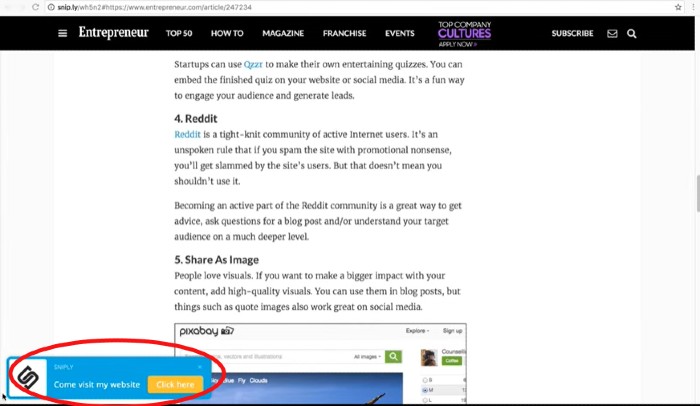
Besides direct traffic, you can drive app downloads, email list signups, and event registrations.
The analytics dashboard allows you to track the number of clicks and conversions.
22. Onalytica
Influencers are a trusted source of information for your customers. A recommendation from them can lift your product sales and brand visibility.
But, how can you find influencers interested in your post, service, or product?
That’s where Onalytica comes in. It finds relevant influencers for your brand based on your article link or uploaded file.
It scans an article, then generates a list of targeted influencers in under a minute. After reverse-engineering relevant influencers, you can connect and start building a relationship.
23. CoSchedule’s Headline Analyzer
Headlines play a key role in engagement. It’s no wonder that Upworthy used to write 25 headlines for every post.
CoSchedule’s Headline Analyzer is a great tool to ensure headlines attract attention—and clicks.
Using it is simple:
- Head over to https://ift.tt/3lotF5k.
- Plug your headline in the “Type your headline here” bar.
- Press the “Analyze Now” button.
You’ll get an overall score for your headline and a grade for the variety of words you’ve used, top keywords in your headline, and the sentiment your headline evokes
24. KingSumo
KingSumo helps brands manage giveaways on social media that can help drive emails sign ups and followers.
To create a giveaway, create a title, description, start and end date, and the number of winners. Then, post it directly to your social accounts.
You can manage and track all of your giveaways from a single dashboard.
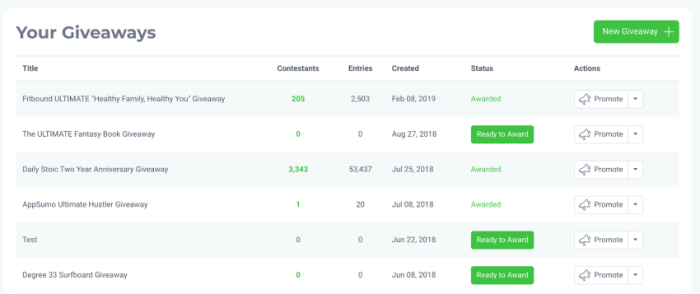
.
25. Facebook Comments Plugin
If a large section of your audience hangs out on Facebook, then activating Facebook Comments on your website can increase engagement and bring you closer to your social media marketing goals.
But, beware. There is a risk of comment scams that easily pass spam filters. You’ll need to stay on top of comment moderation.
Conclusion
Social media can become a huge distraction, even if it does help drive your business. Manually logging in to post blogs and business updates can eat up valuable time you could use to build a new product, take care of vendor orders, or handle customer concerns.
Start incorporating the above tools in your armory to automate repetitive tasks and batch your social media posts.
They’ll save you time every week. They’ll also improve your ROI from social media marketing and your bottom line.
Have I missed any of your favorite social media marketing tools? Can you share your social media productivity secrets? Please let me know in the comments below.
The post 25 Social Media Tools That Experts Use to Streamline Their Marketing appeared first on Neil Patel.
from Neil Patel https://ift.tt/2QfSeGh
No comments